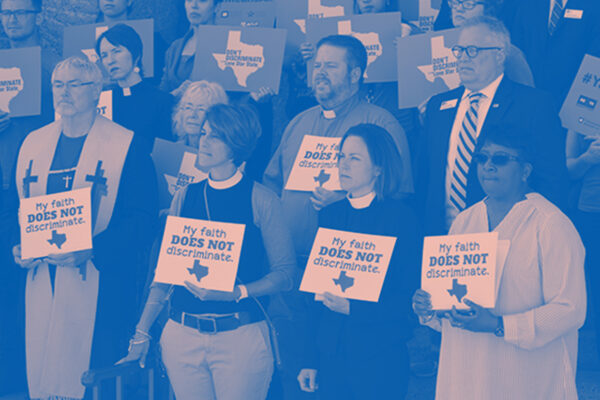Freedom of religion is a central tenet of our state and our country — that is why we have so many laws that protect our right to practice whichever religion we choose.
Yet there are a growing number of bills being proposed in Texas that leave the door wide open to religious freedom to be used as a legal justification for discrimination. These bills and laws are commonly known as “religious refusals,” or the right to refuse providing goods and services based on one’s stated religious beliefs.
Senate Bill 17 is one such bill. This proposed law prohibits a state licensing agency from burdening a license holder's free exercise of religion. It also prohibits state agencies from limiting the ability of a license applicant to get or keep a license based on their sincerely held religious beliefs. This bill offers some protection against discrimination but only if a state agency’s existing professional standards prohibit discrimination or the agency is covered by federal nondiscrimination laws.
But anyone who listened to the arguments made in SB 17’s state Senate hearing could understand that the bill also encourages a climate where religion could be used as a basis to discriminate by prohibiting an agency from causing any burden, no matter how slight, to religious exercise, speech, or association.
So if a state licensee were to claim it is offensive to their religion to serve women of a certain age, or families of a certain race, or a community of a certain religion, SB 17 would give them a law to rest on, making it easier for them to get away with this selective discrimination.
The irony of SB 17 is that it would not provide any meaningful extra protections for religious freedom — there already exist numerous laws that protect an individual’s freedom to practice their religion such as the U.S. Constitution and the Texas Religious Freedom Restoration Act. Senate Bill 17 is simply using the guise of religious freedom to create a backdoor to discriminate, in many cases against people who already struggle with marginalization such as LGBTQ people or religious minorities.
For example, the state has rules ensuring that dyslexia therapists do not provide any services that would discriminate against clients on the basis of race, religion, national origin, age, and other protected classes. But imagine the therapist only wanted to serve kids whose families practice one particular faith, in clear violation of state rules. The state of Texas could sanction the dyslexia therapist for only serving kids from one faith community and denying services to others.
But SB 17 would make it easier for the therapist, who believes their freedom of religion is burdened by the state’s rules, to bring a lawsuit against the state. Not only does SB 17 remove some procedural prerequisites to sue, the dyslexia therapist would not have to show a substantial burden to his or her religious exercise, which current laws require. The therapist could sue for any reason, no matter how seemingly slight.
You can imagine the fury of lawsuits that would ensue by any individual licensed or seeking licensure by the state claiming to have their religious freedom abridged, burdening Texas administrative agencies. Even meritless lawsuits take time and resources to defend in court.
If we are aiming to make our policy and legal systems more efficient and less costly, then we are doing it incorrectly with legislation like this. The Texas Legislature should not be adopting laws that make it easier for those licensed by the state to deny service to certain individuals or groups.
Simply put, making it easier to discriminate is bad public policy.


